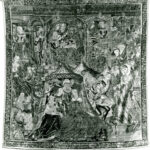Georges Brassens, born on October 22, 1921, in Sète, France, was a highly acclaimed singer-songwriter and poet known for his profound lyrics and distinctive guitar playing style. Considered one of the most influential figures in French chanson, Brassens left an indelible mark on the music industry and continues to be revered as a masterful storyteller. His songs, often characterized by their wit, social commentary, and rebellious spirit, have captivated audiences for decades.
Brassens grew up in a modest working-class family. His father was a bricklayer, and his mother worked as a cleaner. Despite their humble background, they encouraged Brassens’s interest in literature and music from an early age. He discovered his passion for poetry and began writing verses as a teenager, drawing inspiration from classical poets like François Villon and Charles Baudelaire.
During World War II, Brassens evaded conscription and was able to avoid being sent to Germany for forced labor. Instead, he spent much of the war living in relative seclusion, dedicating his time to reading and honing his musical skills. He immersed himself in the works of renowned French poets, such as Paul Verlaine and Victor Hugo, which further influenced his artistic development.
In the post-war years, Brassens began performing in small cafes and bars in Paris, where he gained a loyal following. His breakthrough came in 1952 when he recorded his first album, “La Mauvaise Réputation” (“The Bad Reputation”). The album was met with critical acclaim and showcased Brassens’s unique lyrical style and his ability to tackle taboo subjects with a clever and satirical approach. Songs like “Le Gorille” and “Le Parapluie” became instant hits and established Brassens as a rising star in the French music scene.
Throughout his career, Brassens continued to release a series of successful albums, each showcasing his signature blend of wit, social commentary, and musical craftsmanship. His songs often delved into topics such as love, death, freedom, and the hypocrisy of society. Brassens’s profound lyrics, accompanied by his simple yet captivating guitar melodies, resonated with a broad audience, earning him widespread admiration and popularity.
Despite his fame, Brassens maintained a reclusive lifestyle, seldom appearing on television or giving interviews. He preferred to let his music speak for itself, and his songs became anthems for those seeking a voice of dissent and a champion of individual freedoms.
Georges Brassens’s influence extended far beyond the boundaries of France. His music inspired generations of artists, including Bob Dylan, Leonard Cohen, and Jacques Brel, who recognized his unique talent for storytelling and his ability to capture the human experience with depth and honesty.
Brassens received numerous accolades throughout his career, including the prestigious Grand Prix de Poésie from the French Academy in 1967. He continued to perform and record music until his health began to decline in the 1980s. Georges Brassens passed away on October 29, 1981, in Saint-Gély-du-Fesc, France, leaving behind a rich musical legacy that continues to inspire and resonate with audiences worldwide.
Sources
1. Biography.com: https://www.biography.com/musician/georges-brassens
2. Encyclopædia Britannica: https://www.britannica.com/biography/Georges-Brassens
3. AllMusic: https://www.allmusic.com/artist/georges-brassens-mn0000944754/biography







